Benefits and Disadvantages of AI in Business Accounting at Deloitte
VerifiedAdded on 2023/01/13
|10
|3433
|32
Project
AI Summary
This research proposal investigates the advantages and disadvantages of integrating Artificial Intelligence (AI) into business accounting practices, with a specific focus on Deloitte. The proposal outlines the research rationale, context, aim, objectives, and research questions. It includes a comprehensive literature review that explores the concept of AI, its impact on business accounting, and the challenges companies face when adopting AI. The methodology section details the research philosophy (Interpretivism), approach (Inductive), strategy, design, sampling, data collection, data analysis, and ethical considerations. The research aims to identify the benefits, such as increased productivity and reduced errors, as well as the challenges, including algorithm biases and the need for technical expertise. The proposal seeks to provide recommendations for businesses to overcome these challenges and optimize the use of AI in their accounting processes. The research will employ qualitative methods to gather insights into the practical implications of AI in the accounting field.
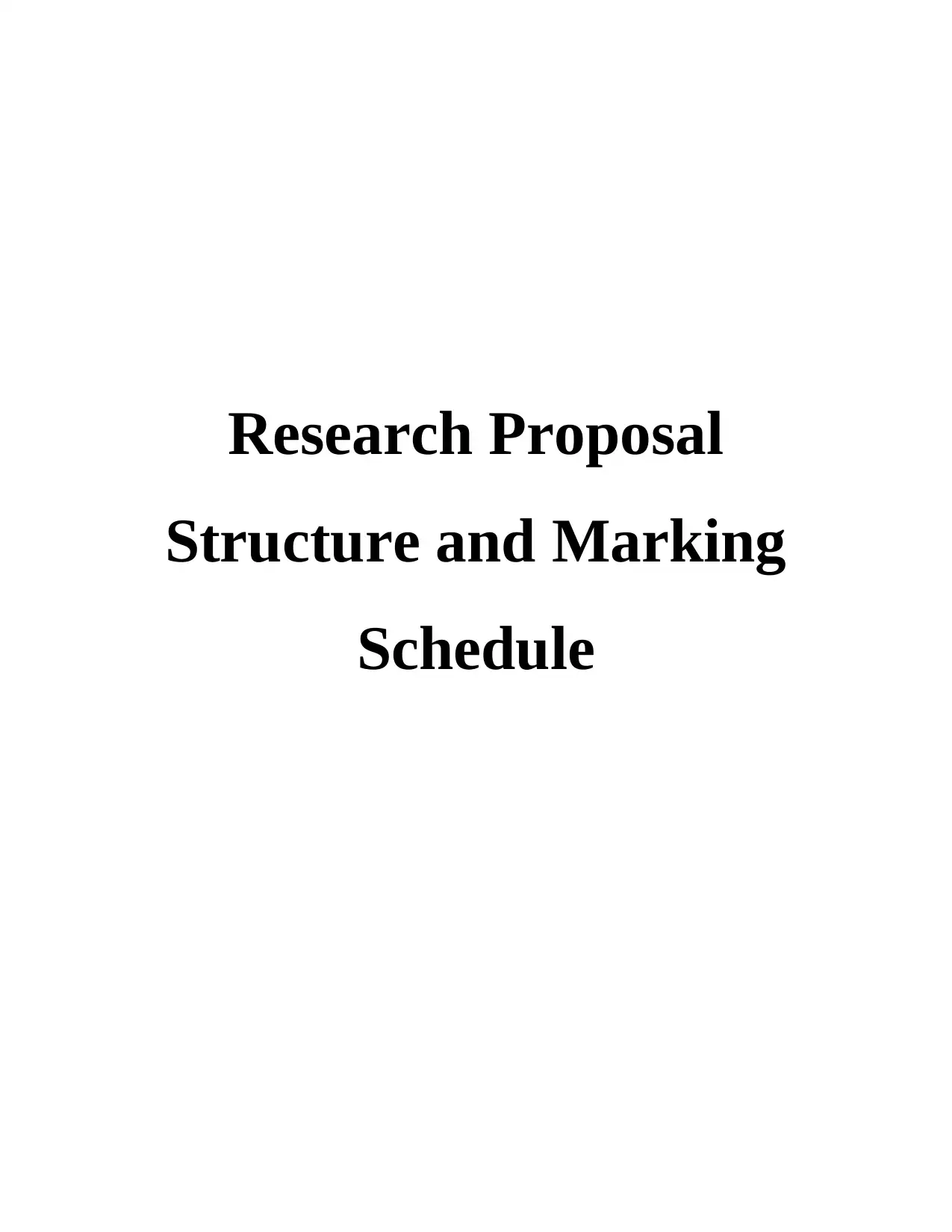
Research Proposal
Structure and Marking
Schedule
Structure and Marking
Schedule
Paraphrase This Document
Need a fresh take? Get an instant paraphrase of this document with our AI Paraphraser
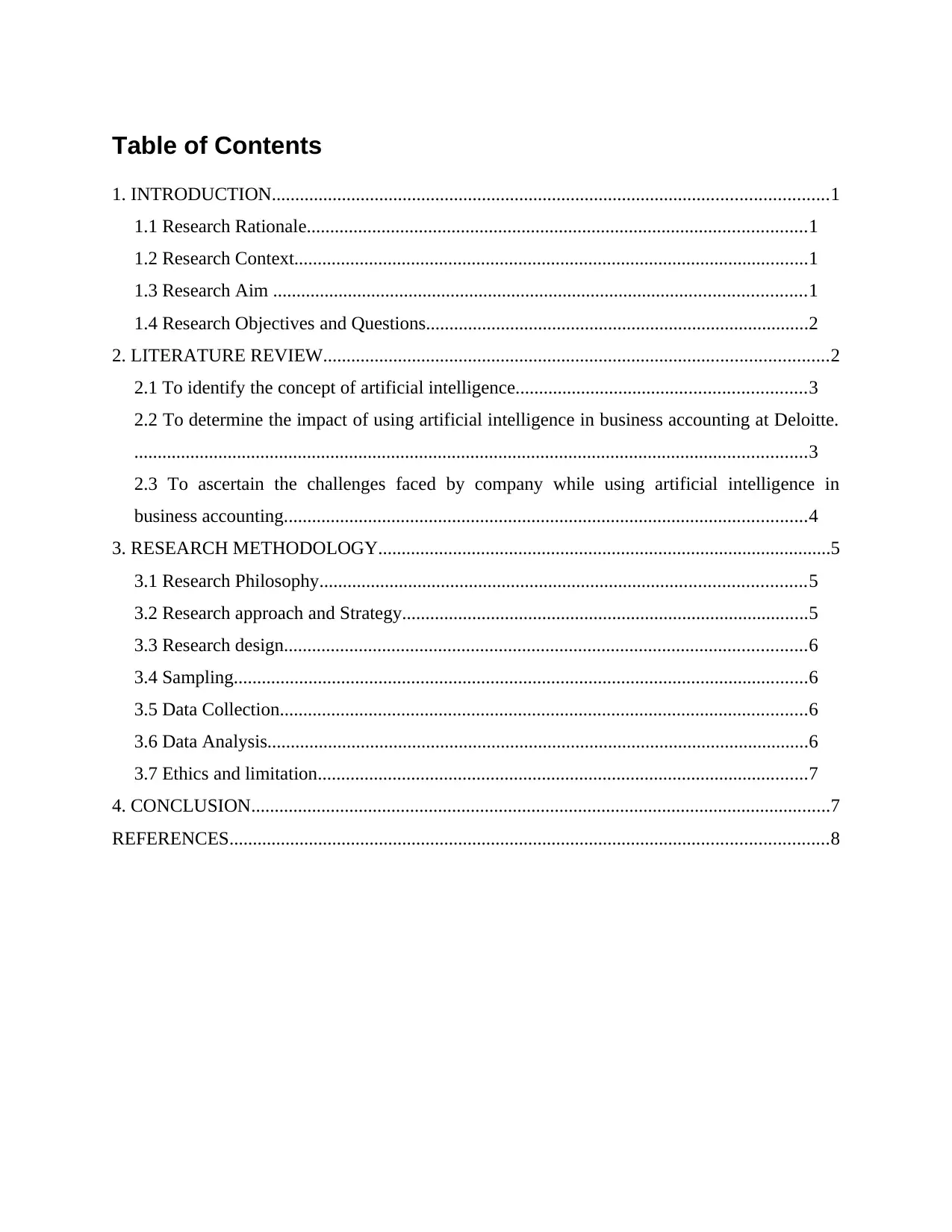
Table of Contents
1. INTRODUCTION.......................................................................................................................1
1.1 Research Rationale...........................................................................................................1
1.2 Research Context..............................................................................................................1
1.3 Research Aim ..................................................................................................................1
1.4 Research Objectives and Questions..................................................................................2
2. LITERATURE REVIEW............................................................................................................2
2.1 To identify the concept of artificial intelligence..............................................................3
2.2 To determine the impact of using artificial intelligence in business accounting at Deloitte.
................................................................................................................................................3
2.3 To ascertain the challenges faced by company while using artificial intelligence in
business accounting................................................................................................................4
3. RESEARCH METHODOLOGY.................................................................................................5
3.1 Research Philosophy........................................................................................................5
3.2 Research approach and Strategy.......................................................................................5
3.3 Research design................................................................................................................6
3.4 Sampling...........................................................................................................................6
3.5 Data Collection.................................................................................................................6
3.6 Data Analysis....................................................................................................................6
3.7 Ethics and limitation.........................................................................................................7
4. CONCLUSION............................................................................................................................7
REFERENCES................................................................................................................................8
1. INTRODUCTION.......................................................................................................................1
1.1 Research Rationale...........................................................................................................1
1.2 Research Context..............................................................................................................1
1.3 Research Aim ..................................................................................................................1
1.4 Research Objectives and Questions..................................................................................2
2. LITERATURE REVIEW............................................................................................................2
2.1 To identify the concept of artificial intelligence..............................................................3
2.2 To determine the impact of using artificial intelligence in business accounting at Deloitte.
................................................................................................................................................3
2.3 To ascertain the challenges faced by company while using artificial intelligence in
business accounting................................................................................................................4
3. RESEARCH METHODOLOGY.................................................................................................5
3.1 Research Philosophy........................................................................................................5
3.2 Research approach and Strategy.......................................................................................5
3.3 Research design................................................................................................................6
3.4 Sampling...........................................................................................................................6
3.5 Data Collection.................................................................................................................6
3.6 Data Analysis....................................................................................................................6
3.7 Ethics and limitation.........................................................................................................7
4. CONCLUSION............................................................................................................................7
REFERENCES................................................................................................................................8
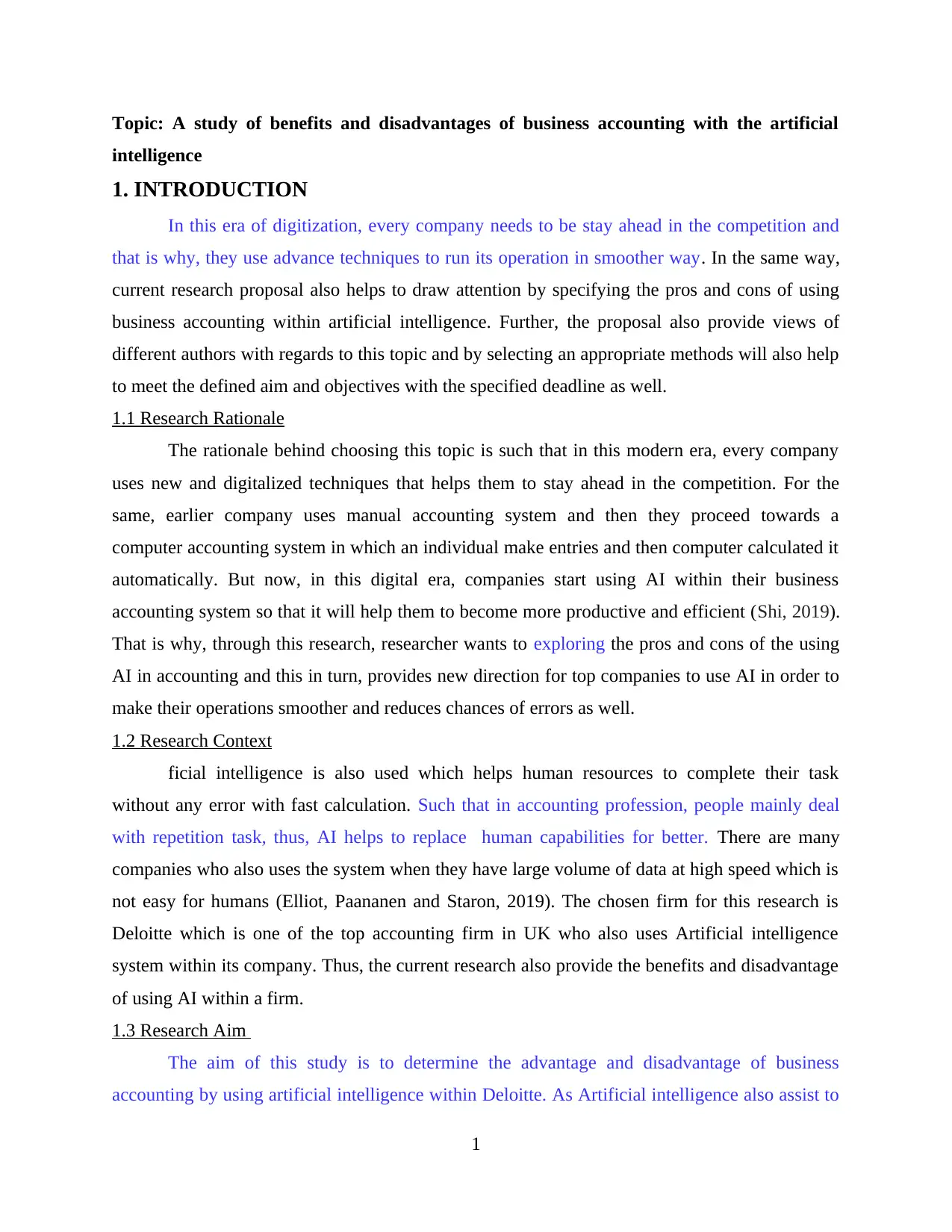
Topic: A study of benefits and disadvantages of business accounting with the artificial
intelligence
1. INTRODUCTION
In this era of digitization, every company needs to be stay ahead in the competition and
that is why, they use advance techniques to run its operation in smoother way. In the same way,
current research proposal also helps to draw attention by specifying the pros and cons of using
business accounting within artificial intelligence. Further, the proposal also provide views of
different authors with regards to this topic and by selecting an appropriate methods will also help
to meet the defined aim and objectives with the specified deadline as well.
1.1 Research Rationale
The rationale behind choosing this topic is such that in this modern era, every company
uses new and digitalized techniques that helps them to stay ahead in the competition. For the
same, earlier company uses manual accounting system and then they proceed towards a
computer accounting system in which an individual make entries and then computer calculated it
automatically. But now, in this digital era, companies start using AI within their business
accounting system so that it will help them to become more productive and efficient (Shi, 2019).
That is why, through this research, researcher wants to exploring the pros and cons of the using
AI in accounting and this in turn, provides new direction for top companies to use AI in order to
make their operations smoother and reduces chances of errors as well.
1.2 Research Context
ficial intelligence is also used which helps human resources to complete their task
without any error with fast calculation. Such that in accounting profession, people mainly deal
with repetition task, thus, AI helps to replace human capabilities for better. There are many
companies who also uses the system when they have large volume of data at high speed which is
not easy for humans (Elliot, Paananen and Staron, 2019). The chosen firm for this research is
Deloitte which is one of the top accounting firm in UK who also uses Artificial intelligence
system within its company. Thus, the current research also provide the benefits and disadvantage
of using AI within a firm.
1.3 Research Aim
The aim of this study is to determine the advantage and disadvantage of business
accounting by using artificial intelligence within Deloitte. As Artificial intelligence also assist to
1
intelligence
1. INTRODUCTION
In this era of digitization, every company needs to be stay ahead in the competition and
that is why, they use advance techniques to run its operation in smoother way. In the same way,
current research proposal also helps to draw attention by specifying the pros and cons of using
business accounting within artificial intelligence. Further, the proposal also provide views of
different authors with regards to this topic and by selecting an appropriate methods will also help
to meet the defined aim and objectives with the specified deadline as well.
1.1 Research Rationale
The rationale behind choosing this topic is such that in this modern era, every company
uses new and digitalized techniques that helps them to stay ahead in the competition. For the
same, earlier company uses manual accounting system and then they proceed towards a
computer accounting system in which an individual make entries and then computer calculated it
automatically. But now, in this digital era, companies start using AI within their business
accounting system so that it will help them to become more productive and efficient (Shi, 2019).
That is why, through this research, researcher wants to exploring the pros and cons of the using
AI in accounting and this in turn, provides new direction for top companies to use AI in order to
make their operations smoother and reduces chances of errors as well.
1.2 Research Context
ficial intelligence is also used which helps human resources to complete their task
without any error with fast calculation. Such that in accounting profession, people mainly deal
with repetition task, thus, AI helps to replace human capabilities for better. There are many
companies who also uses the system when they have large volume of data at high speed which is
not easy for humans (Elliot, Paananen and Staron, 2019). The chosen firm for this research is
Deloitte which is one of the top accounting firm in UK who also uses Artificial intelligence
system within its company. Thus, the current research also provide the benefits and disadvantage
of using AI within a firm.
1.3 Research Aim
The aim of this study is to determine the advantage and disadvantage of business
accounting by using artificial intelligence within Deloitte. As Artificial intelligence also assist to
1
⊘ This is a preview!⊘
Do you want full access?
Subscribe today to unlock all pages.

Trusted by 1+ million students worldwide
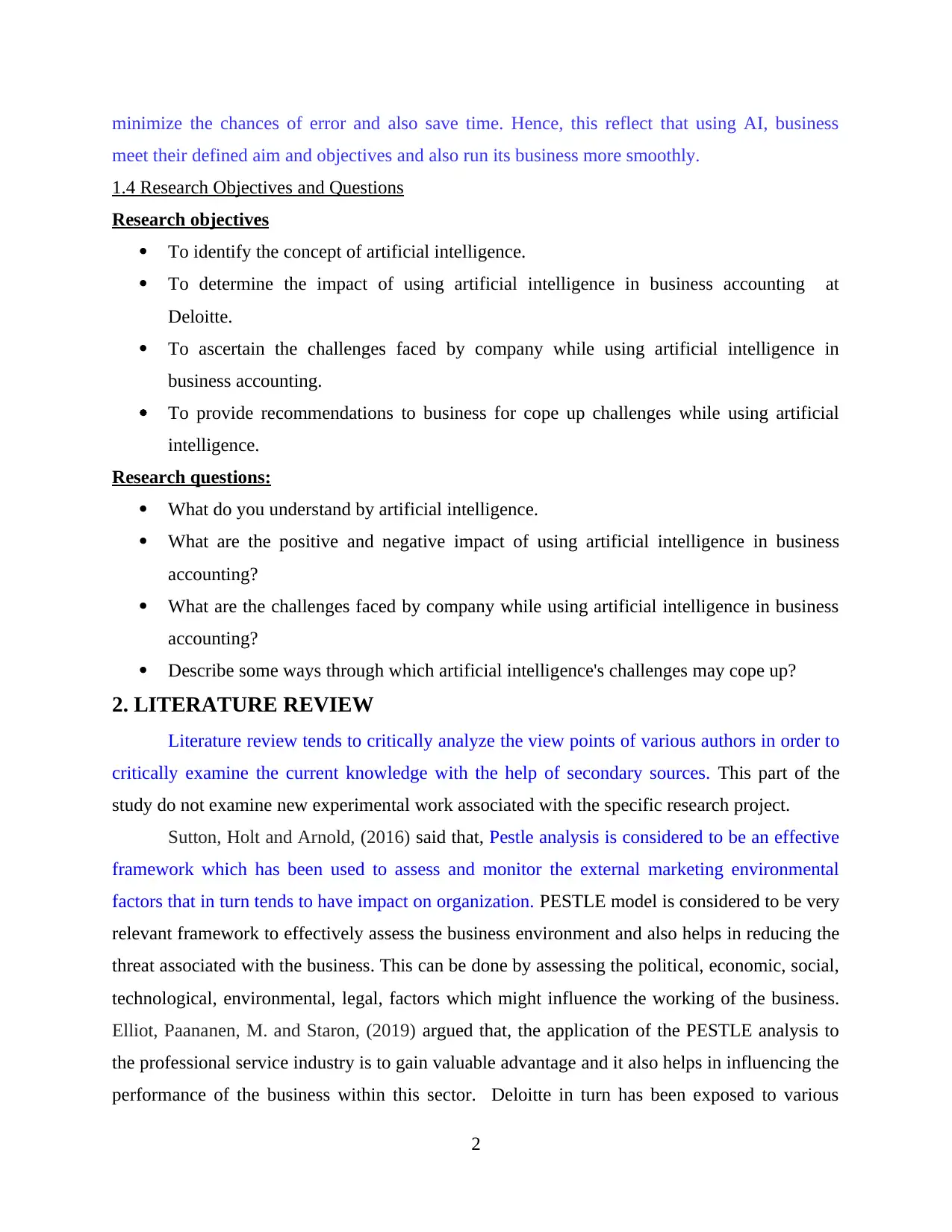
minimize the chances of error and also save time. Hence, this reflect that using AI, business
meet their defined aim and objectives and also run its business more smoothly.
1.4 Research Objectives and Questions
Research objectives
To identify the concept of artificial intelligence.
To determine the impact of using artificial intelligence in business accounting at
Deloitte.
To ascertain the challenges faced by company while using artificial intelligence in
business accounting.
To provide recommendations to business for cope up challenges while using artificial
intelligence.
Research questions:
What do you understand by artificial intelligence.
What are the positive and negative impact of using artificial intelligence in business
accounting?
What are the challenges faced by company while using artificial intelligence in business
accounting?
Describe some ways through which artificial intelligence's challenges may cope up?
2. LITERATURE REVIEW
Literature review tends to critically analyze the view points of various authors in order to
critically examine the current knowledge with the help of secondary sources. This part of the
study do not examine new experimental work associated with the specific research project.
Sutton, Holt and Arnold, (2016) said that, Pestle analysis is considered to be an effective
framework which has been used to assess and monitor the external marketing environmental
factors that in turn tends to have impact on organization. PESTLE model is considered to be very
relevant framework to effectively assess the business environment and also helps in reducing the
threat associated with the business. This can be done by assessing the political, economic, social,
technological, environmental, legal, factors which might influence the working of the business.
Elliot, Paananen, M. and Staron, (2019) argued that, the application of the PESTLE analysis to
the professional service industry is to gain valuable advantage and it also helps in influencing the
performance of the business within this sector. Deloitte in turn has been exposed to various
2
meet their defined aim and objectives and also run its business more smoothly.
1.4 Research Objectives and Questions
Research objectives
To identify the concept of artificial intelligence.
To determine the impact of using artificial intelligence in business accounting at
Deloitte.
To ascertain the challenges faced by company while using artificial intelligence in
business accounting.
To provide recommendations to business for cope up challenges while using artificial
intelligence.
Research questions:
What do you understand by artificial intelligence.
What are the positive and negative impact of using artificial intelligence in business
accounting?
What are the challenges faced by company while using artificial intelligence in business
accounting?
Describe some ways through which artificial intelligence's challenges may cope up?
2. LITERATURE REVIEW
Literature review tends to critically analyze the view points of various authors in order to
critically examine the current knowledge with the help of secondary sources. This part of the
study do not examine new experimental work associated with the specific research project.
Sutton, Holt and Arnold, (2016) said that, Pestle analysis is considered to be an effective
framework which has been used to assess and monitor the external marketing environmental
factors that in turn tends to have impact on organization. PESTLE model is considered to be very
relevant framework to effectively assess the business environment and also helps in reducing the
threat associated with the business. This can be done by assessing the political, economic, social,
technological, environmental, legal, factors which might influence the working of the business.
Elliot, Paananen, M. and Staron, (2019) argued that, the application of the PESTLE analysis to
the professional service industry is to gain valuable advantage and it also helps in influencing the
performance of the business within this sector. Deloitte in turn has been exposed to various
2
Paraphrase This Document
Need a fresh take? Get an instant paraphrase of this document with our AI Paraphraser
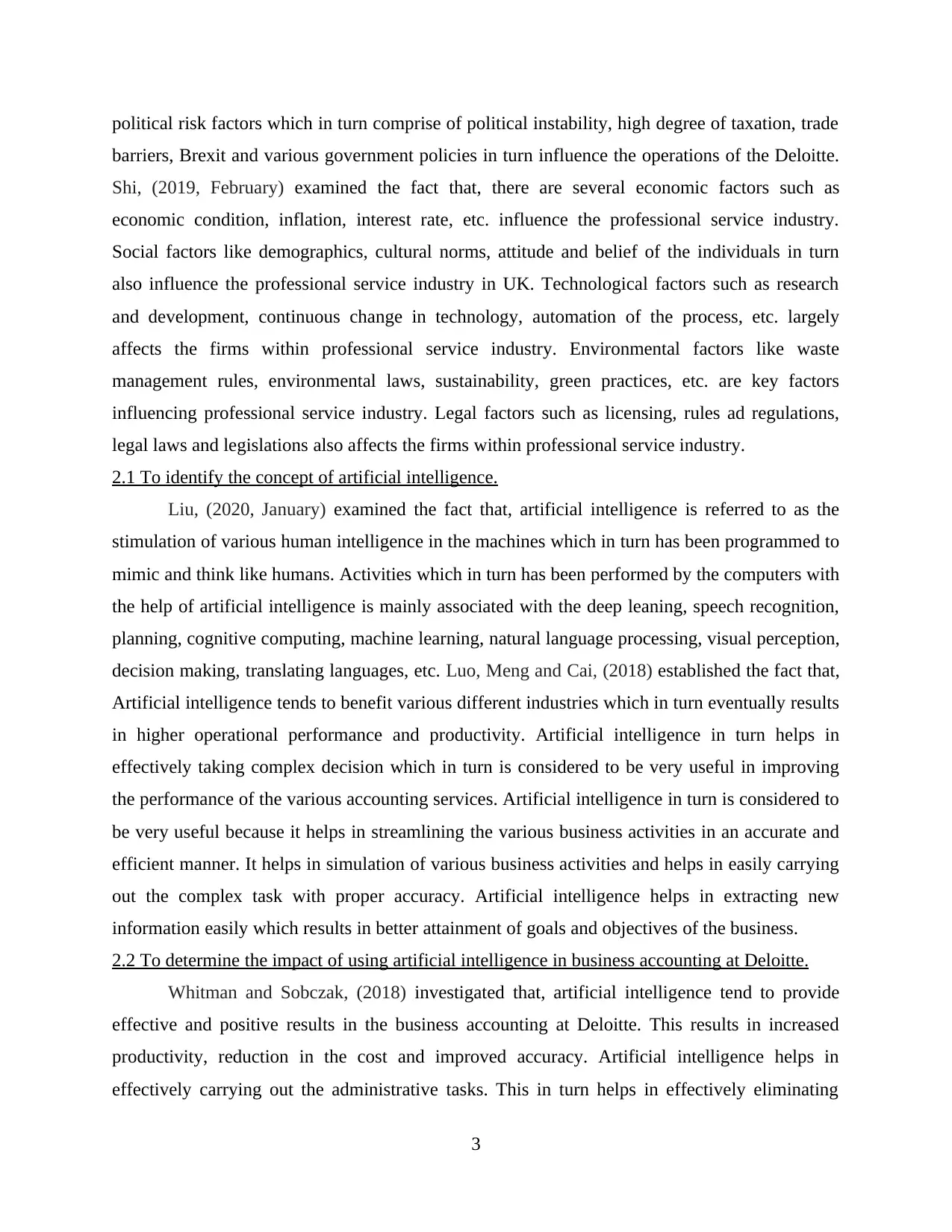
political risk factors which in turn comprise of political instability, high degree of taxation, trade
barriers, Brexit and various government policies in turn influence the operations of the Deloitte.
Shi, (2019, February) examined the fact that, there are several economic factors such as
economic condition, inflation, interest rate, etc. influence the professional service industry.
Social factors like demographics, cultural norms, attitude and belief of the individuals in turn
also influence the professional service industry in UK. Technological factors such as research
and development, continuous change in technology, automation of the process, etc. largely
affects the firms within professional service industry. Environmental factors like waste
management rules, environmental laws, sustainability, green practices, etc. are key factors
influencing professional service industry. Legal factors such as licensing, rules ad regulations,
legal laws and legislations also affects the firms within professional service industry.
2.1 To identify the concept of artificial intelligence.
Liu, (2020, January) examined the fact that, artificial intelligence is referred to as the
stimulation of various human intelligence in the machines which in turn has been programmed to
mimic and think like humans. Activities which in turn has been performed by the computers with
the help of artificial intelligence is mainly associated with the deep leaning, speech recognition,
planning, cognitive computing, machine learning, natural language processing, visual perception,
decision making, translating languages, etc. Luo, Meng and Cai, (2018) established the fact that,
Artificial intelligence tends to benefit various different industries which in turn eventually results
in higher operational performance and productivity. Artificial intelligence in turn helps in
effectively taking complex decision which in turn is considered to be very useful in improving
the performance of the various accounting services. Artificial intelligence in turn is considered to
be very useful because it helps in streamlining the various business activities in an accurate and
efficient manner. It helps in simulation of various business activities and helps in easily carrying
out the complex task with proper accuracy. Artificial intelligence helps in extracting new
information easily which results in better attainment of goals and objectives of the business.
2.2 To determine the impact of using artificial intelligence in business accounting at Deloitte.
Whitman and Sobczak, (2018) investigated that, artificial intelligence tend to provide
effective and positive results in the business accounting at Deloitte. This results in increased
productivity, reduction in the cost and improved accuracy. Artificial intelligence helps in
effectively carrying out the administrative tasks. This in turn helps in effectively eliminating
3
barriers, Brexit and various government policies in turn influence the operations of the Deloitte.
Shi, (2019, February) examined the fact that, there are several economic factors such as
economic condition, inflation, interest rate, etc. influence the professional service industry.
Social factors like demographics, cultural norms, attitude and belief of the individuals in turn
also influence the professional service industry in UK. Technological factors such as research
and development, continuous change in technology, automation of the process, etc. largely
affects the firms within professional service industry. Environmental factors like waste
management rules, environmental laws, sustainability, green practices, etc. are key factors
influencing professional service industry. Legal factors such as licensing, rules ad regulations,
legal laws and legislations also affects the firms within professional service industry.
2.1 To identify the concept of artificial intelligence.
Liu, (2020, January) examined the fact that, artificial intelligence is referred to as the
stimulation of various human intelligence in the machines which in turn has been programmed to
mimic and think like humans. Activities which in turn has been performed by the computers with
the help of artificial intelligence is mainly associated with the deep leaning, speech recognition,
planning, cognitive computing, machine learning, natural language processing, visual perception,
decision making, translating languages, etc. Luo, Meng and Cai, (2018) established the fact that,
Artificial intelligence tends to benefit various different industries which in turn eventually results
in higher operational performance and productivity. Artificial intelligence in turn helps in
effectively taking complex decision which in turn is considered to be very useful in improving
the performance of the various accounting services. Artificial intelligence in turn is considered to
be very useful because it helps in streamlining the various business activities in an accurate and
efficient manner. It helps in simulation of various business activities and helps in easily carrying
out the complex task with proper accuracy. Artificial intelligence helps in extracting new
information easily which results in better attainment of goals and objectives of the business.
2.2 To determine the impact of using artificial intelligence in business accounting at Deloitte.
Whitman and Sobczak, (2018) investigated that, artificial intelligence tend to provide
effective and positive results in the business accounting at Deloitte. This results in increased
productivity, reduction in the cost and improved accuracy. Artificial intelligence helps in
effectively carrying out the administrative tasks. This in turn helps in effectively eliminating
3
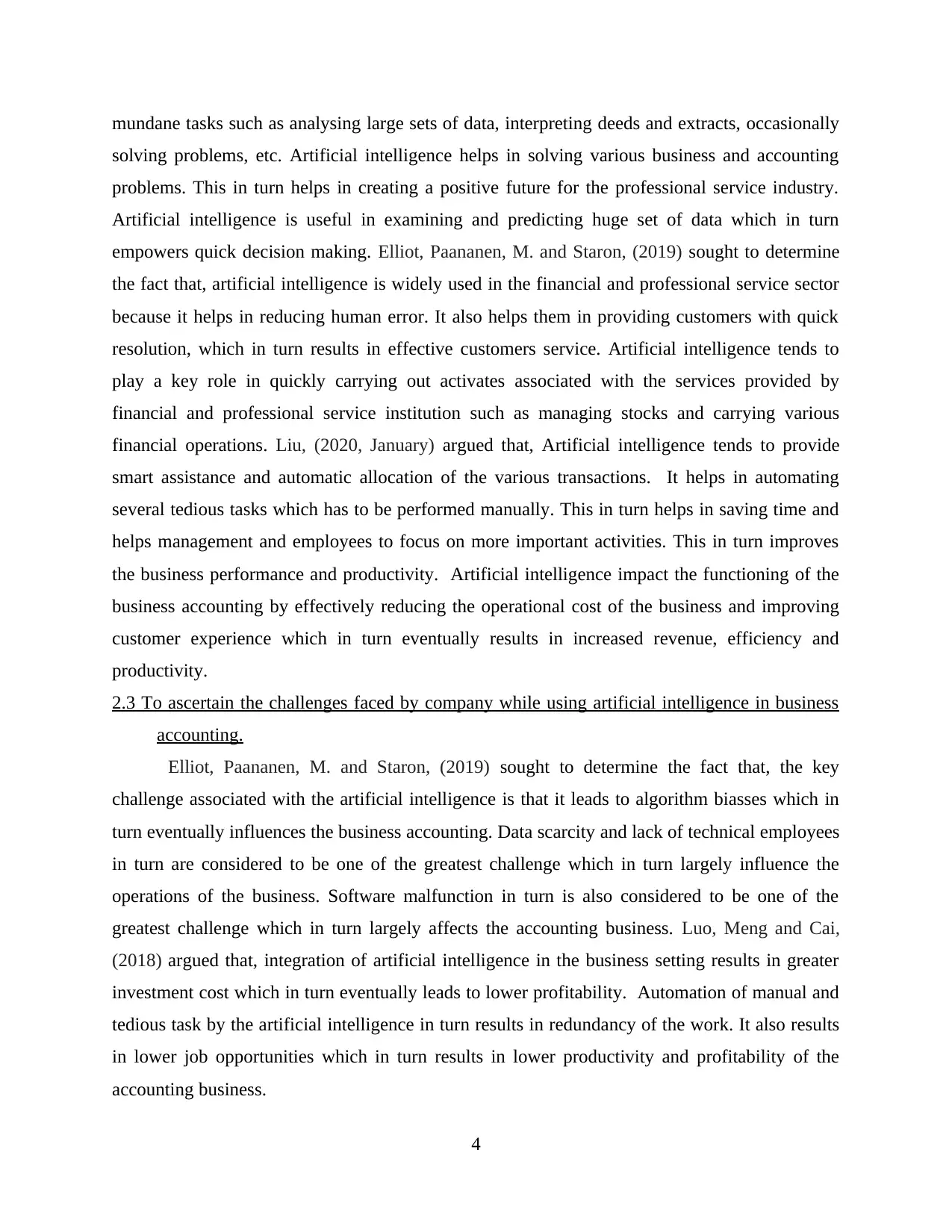
mundane tasks such as analysing large sets of data, interpreting deeds and extracts, occasionally
solving problems, etc. Artificial intelligence helps in solving various business and accounting
problems. This in turn helps in creating a positive future for the professional service industry.
Artificial intelligence is useful in examining and predicting huge set of data which in turn
empowers quick decision making. Elliot, Paananen, M. and Staron, (2019) sought to determine
the fact that, artificial intelligence is widely used in the financial and professional service sector
because it helps in reducing human error. It also helps them in providing customers with quick
resolution, which in turn results in effective customers service. Artificial intelligence tends to
play a key role in quickly carrying out activates associated with the services provided by
financial and professional service institution such as managing stocks and carrying various
financial operations. Liu, (2020, January) argued that, Artificial intelligence tends to provide
smart assistance and automatic allocation of the various transactions. It helps in automating
several tedious tasks which has to be performed manually. This in turn helps in saving time and
helps management and employees to focus on more important activities. This in turn improves
the business performance and productivity. Artificial intelligence impact the functioning of the
business accounting by effectively reducing the operational cost of the business and improving
customer experience which in turn eventually results in increased revenue, efficiency and
productivity.
2.3 To ascertain the challenges faced by company while using artificial intelligence in business
accounting.
Elliot, Paananen, M. and Staron, (2019) sought to determine the fact that, the key
challenge associated with the artificial intelligence is that it leads to algorithm biasses which in
turn eventually influences the business accounting. Data scarcity and lack of technical employees
in turn are considered to be one of the greatest challenge which in turn largely influence the
operations of the business. Software malfunction in turn is also considered to be one of the
greatest challenge which in turn largely affects the accounting business. Luo, Meng and Cai,
(2018) argued that, integration of artificial intelligence in the business setting results in greater
investment cost which in turn eventually leads to lower profitability. Automation of manual and
tedious task by the artificial intelligence in turn results in redundancy of the work. It also results
in lower job opportunities which in turn results in lower productivity and profitability of the
accounting business.
4
solving problems, etc. Artificial intelligence helps in solving various business and accounting
problems. This in turn helps in creating a positive future for the professional service industry.
Artificial intelligence is useful in examining and predicting huge set of data which in turn
empowers quick decision making. Elliot, Paananen, M. and Staron, (2019) sought to determine
the fact that, artificial intelligence is widely used in the financial and professional service sector
because it helps in reducing human error. It also helps them in providing customers with quick
resolution, which in turn results in effective customers service. Artificial intelligence tends to
play a key role in quickly carrying out activates associated with the services provided by
financial and professional service institution such as managing stocks and carrying various
financial operations. Liu, (2020, January) argued that, Artificial intelligence tends to provide
smart assistance and automatic allocation of the various transactions. It helps in automating
several tedious tasks which has to be performed manually. This in turn helps in saving time and
helps management and employees to focus on more important activities. This in turn improves
the business performance and productivity. Artificial intelligence impact the functioning of the
business accounting by effectively reducing the operational cost of the business and improving
customer experience which in turn eventually results in increased revenue, efficiency and
productivity.
2.3 To ascertain the challenges faced by company while using artificial intelligence in business
accounting.
Elliot, Paananen, M. and Staron, (2019) sought to determine the fact that, the key
challenge associated with the artificial intelligence is that it leads to algorithm biasses which in
turn eventually influences the business accounting. Data scarcity and lack of technical employees
in turn are considered to be one of the greatest challenge which in turn largely influence the
operations of the business. Software malfunction in turn is also considered to be one of the
greatest challenge which in turn largely affects the accounting business. Luo, Meng and Cai,
(2018) argued that, integration of artificial intelligence in the business setting results in greater
investment cost which in turn eventually leads to lower profitability. Automation of manual and
tedious task by the artificial intelligence in turn results in redundancy of the work. It also results
in lower job opportunities which in turn results in lower productivity and profitability of the
accounting business.
4
⊘ This is a preview!⊘
Do you want full access?
Subscribe today to unlock all pages.

Trusted by 1+ million students worldwide
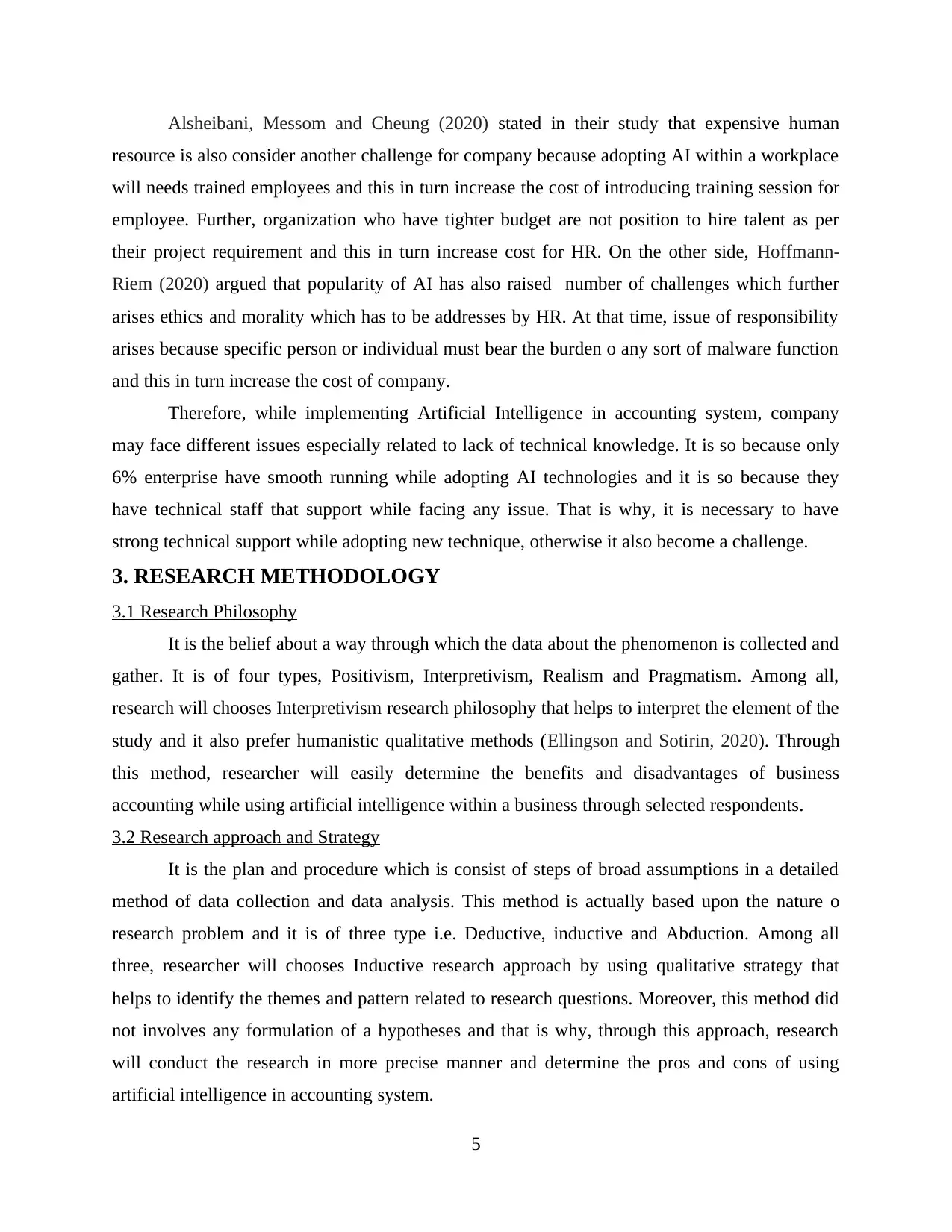
Alsheibani, Messom and Cheung (2020) stated in their study that expensive human
resource is also consider another challenge for company because adopting AI within a workplace
will needs trained employees and this in turn increase the cost of introducing training session for
employee. Further, organization who have tighter budget are not position to hire talent as per
their project requirement and this in turn increase cost for HR. On the other side, Hoffmann-
Riem (2020) argued that popularity of AI has also raised number of challenges which further
arises ethics and morality which has to be addresses by HR. At that time, issue of responsibility
arises because specific person or individual must bear the burden o any sort of malware function
and this in turn increase the cost of company.
Therefore, while implementing Artificial Intelligence in accounting system, company
may face different issues especially related to lack of technical knowledge. It is so because only
6% enterprise have smooth running while adopting AI technologies and it is so because they
have technical staff that support while facing any issue. That is why, it is necessary to have
strong technical support while adopting new technique, otherwise it also become a challenge.
3. RESEARCH METHODOLOGY
3.1 Research Philosophy
It is the belief about a way through which the data about the phenomenon is collected and
gather. It is of four types, Positivism, Interpretivism, Realism and Pragmatism. Among all,
research will chooses Interpretivism research philosophy that helps to interpret the element of the
study and it also prefer humanistic qualitative methods (Ellingson and Sotirin, 2020). Through
this method, researcher will easily determine the benefits and disadvantages of business
accounting while using artificial intelligence within a business through selected respondents.
3.2 Research approach and Strategy
It is the plan and procedure which is consist of steps of broad assumptions in a detailed
method of data collection and data analysis. This method is actually based upon the nature o
research problem and it is of three type i.e. Deductive, inductive and Abduction. Among all
three, researcher will chooses Inductive research approach by using qualitative strategy that
helps to identify the themes and pattern related to research questions. Moreover, this method did
not involves any formulation of a hypotheses and that is why, through this approach, research
will conduct the research in more precise manner and determine the pros and cons of using
artificial intelligence in accounting system.
5
resource is also consider another challenge for company because adopting AI within a workplace
will needs trained employees and this in turn increase the cost of introducing training session for
employee. Further, organization who have tighter budget are not position to hire talent as per
their project requirement and this in turn increase cost for HR. On the other side, Hoffmann-
Riem (2020) argued that popularity of AI has also raised number of challenges which further
arises ethics and morality which has to be addresses by HR. At that time, issue of responsibility
arises because specific person or individual must bear the burden o any sort of malware function
and this in turn increase the cost of company.
Therefore, while implementing Artificial Intelligence in accounting system, company
may face different issues especially related to lack of technical knowledge. It is so because only
6% enterprise have smooth running while adopting AI technologies and it is so because they
have technical staff that support while facing any issue. That is why, it is necessary to have
strong technical support while adopting new technique, otherwise it also become a challenge.
3. RESEARCH METHODOLOGY
3.1 Research Philosophy
It is the belief about a way through which the data about the phenomenon is collected and
gather. It is of four types, Positivism, Interpretivism, Realism and Pragmatism. Among all,
research will chooses Interpretivism research philosophy that helps to interpret the element of the
study and it also prefer humanistic qualitative methods (Ellingson and Sotirin, 2020). Through
this method, researcher will easily determine the benefits and disadvantages of business
accounting while using artificial intelligence within a business through selected respondents.
3.2 Research approach and Strategy
It is the plan and procedure which is consist of steps of broad assumptions in a detailed
method of data collection and data analysis. This method is actually based upon the nature o
research problem and it is of three type i.e. Deductive, inductive and Abduction. Among all
three, researcher will chooses Inductive research approach by using qualitative strategy that
helps to identify the themes and pattern related to research questions. Moreover, this method did
not involves any formulation of a hypotheses and that is why, through this approach, research
will conduct the research in more precise manner and determine the pros and cons of using
artificial intelligence in accounting system.
5
Paraphrase This Document
Need a fresh take? Get an instant paraphrase of this document with our AI Paraphraser
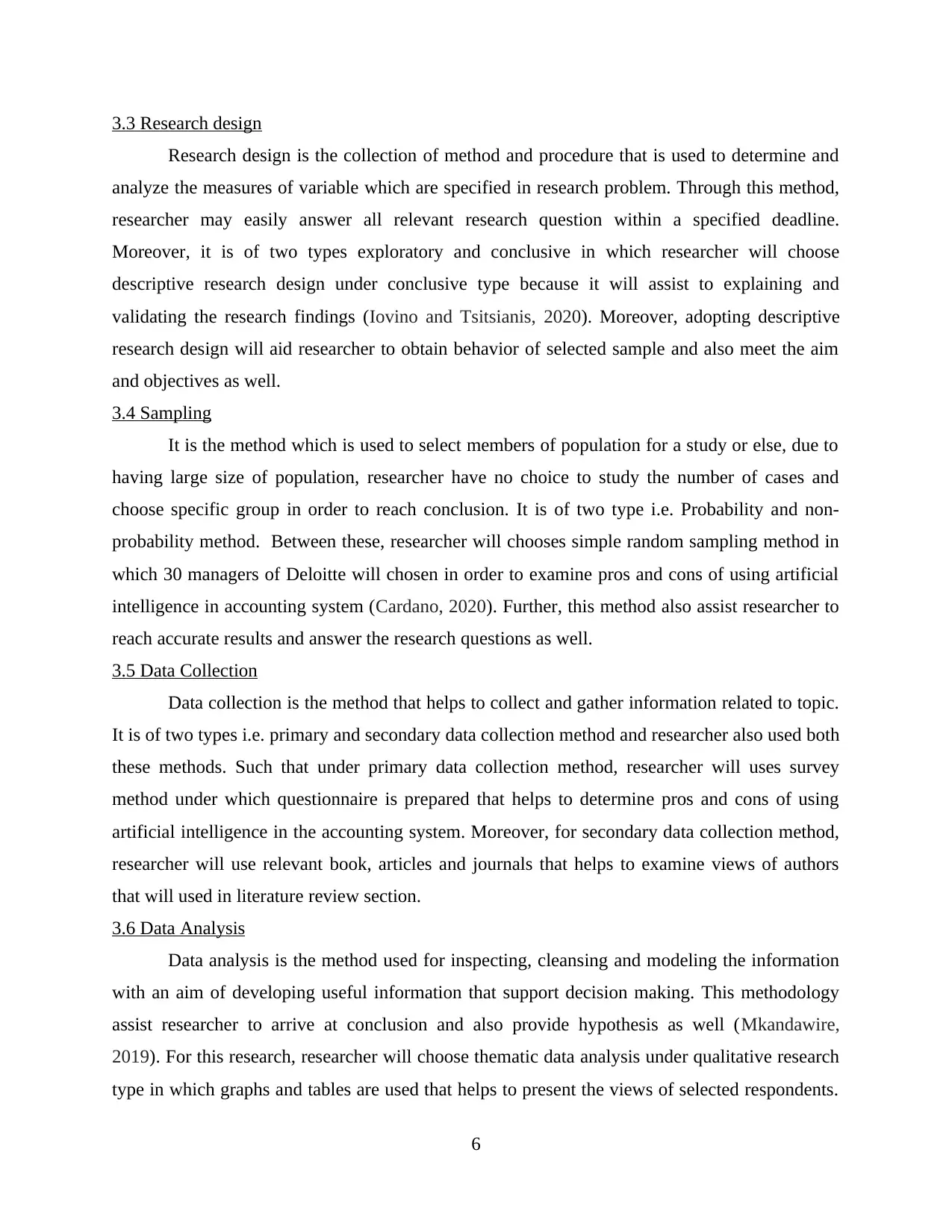
3.3 Research design
Research design is the collection of method and procedure that is used to determine and
analyze the measures of variable which are specified in research problem. Through this method,
researcher may easily answer all relevant research question within a specified deadline.
Moreover, it is of two types exploratory and conclusive in which researcher will choose
descriptive research design under conclusive type because it will assist to explaining and
validating the research findings (Iovino and Tsitsianis, 2020). Moreover, adopting descriptive
research design will aid researcher to obtain behavior of selected sample and also meet the aim
and objectives as well.
3.4 Sampling
It is the method which is used to select members of population for a study or else, due to
having large size of population, researcher have no choice to study the number of cases and
choose specific group in order to reach conclusion. It is of two type i.e. Probability and non-
probability method. Between these, researcher will chooses simple random sampling method in
which 30 managers of Deloitte will chosen in order to examine pros and cons of using artificial
intelligence in accounting system (Cardano, 2020). Further, this method also assist researcher to
reach accurate results and answer the research questions as well.
3.5 Data Collection
Data collection is the method that helps to collect and gather information related to topic.
It is of two types i.e. primary and secondary data collection method and researcher also used both
these methods. Such that under primary data collection method, researcher will uses survey
method under which questionnaire is prepared that helps to determine pros and cons of using
artificial intelligence in the accounting system. Moreover, for secondary data collection method,
researcher will use relevant book, articles and journals that helps to examine views of authors
that will used in literature review section.
3.6 Data Analysis
Data analysis is the method used for inspecting, cleansing and modeling the information
with an aim of developing useful information that support decision making. This methodology
assist researcher to arrive at conclusion and also provide hypothesis as well (Mkandawire,
2019). For this research, researcher will choose thematic data analysis under qualitative research
type in which graphs and tables are used that helps to present the views of selected respondents.
6
Research design is the collection of method and procedure that is used to determine and
analyze the measures of variable which are specified in research problem. Through this method,
researcher may easily answer all relevant research question within a specified deadline.
Moreover, it is of two types exploratory and conclusive in which researcher will choose
descriptive research design under conclusive type because it will assist to explaining and
validating the research findings (Iovino and Tsitsianis, 2020). Moreover, adopting descriptive
research design will aid researcher to obtain behavior of selected sample and also meet the aim
and objectives as well.
3.4 Sampling
It is the method which is used to select members of population for a study or else, due to
having large size of population, researcher have no choice to study the number of cases and
choose specific group in order to reach conclusion. It is of two type i.e. Probability and non-
probability method. Between these, researcher will chooses simple random sampling method in
which 30 managers of Deloitte will chosen in order to examine pros and cons of using artificial
intelligence in accounting system (Cardano, 2020). Further, this method also assist researcher to
reach accurate results and answer the research questions as well.
3.5 Data Collection
Data collection is the method that helps to collect and gather information related to topic.
It is of two types i.e. primary and secondary data collection method and researcher also used both
these methods. Such that under primary data collection method, researcher will uses survey
method under which questionnaire is prepared that helps to determine pros and cons of using
artificial intelligence in the accounting system. Moreover, for secondary data collection method,
researcher will use relevant book, articles and journals that helps to examine views of authors
that will used in literature review section.
3.6 Data Analysis
Data analysis is the method used for inspecting, cleansing and modeling the information
with an aim of developing useful information that support decision making. This methodology
assist researcher to arrive at conclusion and also provide hypothesis as well (Mkandawire,
2019). For this research, researcher will choose thematic data analysis under qualitative research
type in which graphs and tables are used that helps to present the views of selected respondents.
6
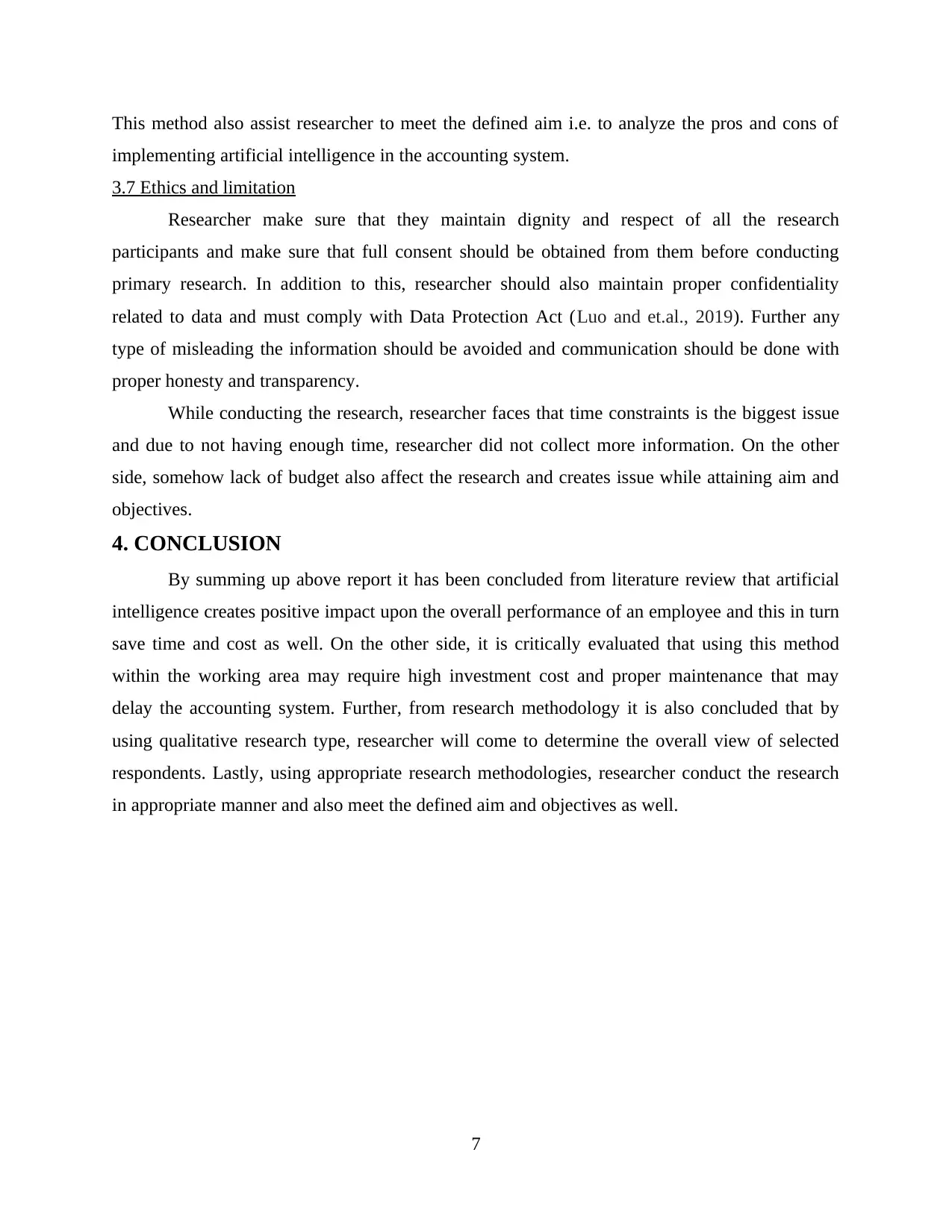
This method also assist researcher to meet the defined aim i.e. to analyze the pros and cons of
implementing artificial intelligence in the accounting system.
3.7 Ethics and limitation
Researcher make sure that they maintain dignity and respect of all the research
participants and make sure that full consent should be obtained from them before conducting
primary research. In addition to this, researcher should also maintain proper confidentiality
related to data and must comply with Data Protection Act (Luo and et.al., 2019). Further any
type of misleading the information should be avoided and communication should be done with
proper honesty and transparency.
While conducting the research, researcher faces that time constraints is the biggest issue
and due to not having enough time, researcher did not collect more information. On the other
side, somehow lack of budget also affect the research and creates issue while attaining aim and
objectives.
4. CONCLUSION
By summing up above report it has been concluded from literature review that artificial
intelligence creates positive impact upon the overall performance of an employee and this in turn
save time and cost as well. On the other side, it is critically evaluated that using this method
within the working area may require high investment cost and proper maintenance that may
delay the accounting system. Further, from research methodology it is also concluded that by
using qualitative research type, researcher will come to determine the overall view of selected
respondents. Lastly, using appropriate research methodologies, researcher conduct the research
in appropriate manner and also meet the defined aim and objectives as well.
7
implementing artificial intelligence in the accounting system.
3.7 Ethics and limitation
Researcher make sure that they maintain dignity and respect of all the research
participants and make sure that full consent should be obtained from them before conducting
primary research. In addition to this, researcher should also maintain proper confidentiality
related to data and must comply with Data Protection Act (Luo and et.al., 2019). Further any
type of misleading the information should be avoided and communication should be done with
proper honesty and transparency.
While conducting the research, researcher faces that time constraints is the biggest issue
and due to not having enough time, researcher did not collect more information. On the other
side, somehow lack of budget also affect the research and creates issue while attaining aim and
objectives.
4. CONCLUSION
By summing up above report it has been concluded from literature review that artificial
intelligence creates positive impact upon the overall performance of an employee and this in turn
save time and cost as well. On the other side, it is critically evaluated that using this method
within the working area may require high investment cost and proper maintenance that may
delay the accounting system. Further, from research methodology it is also concluded that by
using qualitative research type, researcher will come to determine the overall view of selected
respondents. Lastly, using appropriate research methodologies, researcher conduct the research
in appropriate manner and also meet the defined aim and objectives as well.
7
⊘ This is a preview!⊘
Do you want full access?
Subscribe today to unlock all pages.

Trusted by 1+ million students worldwide
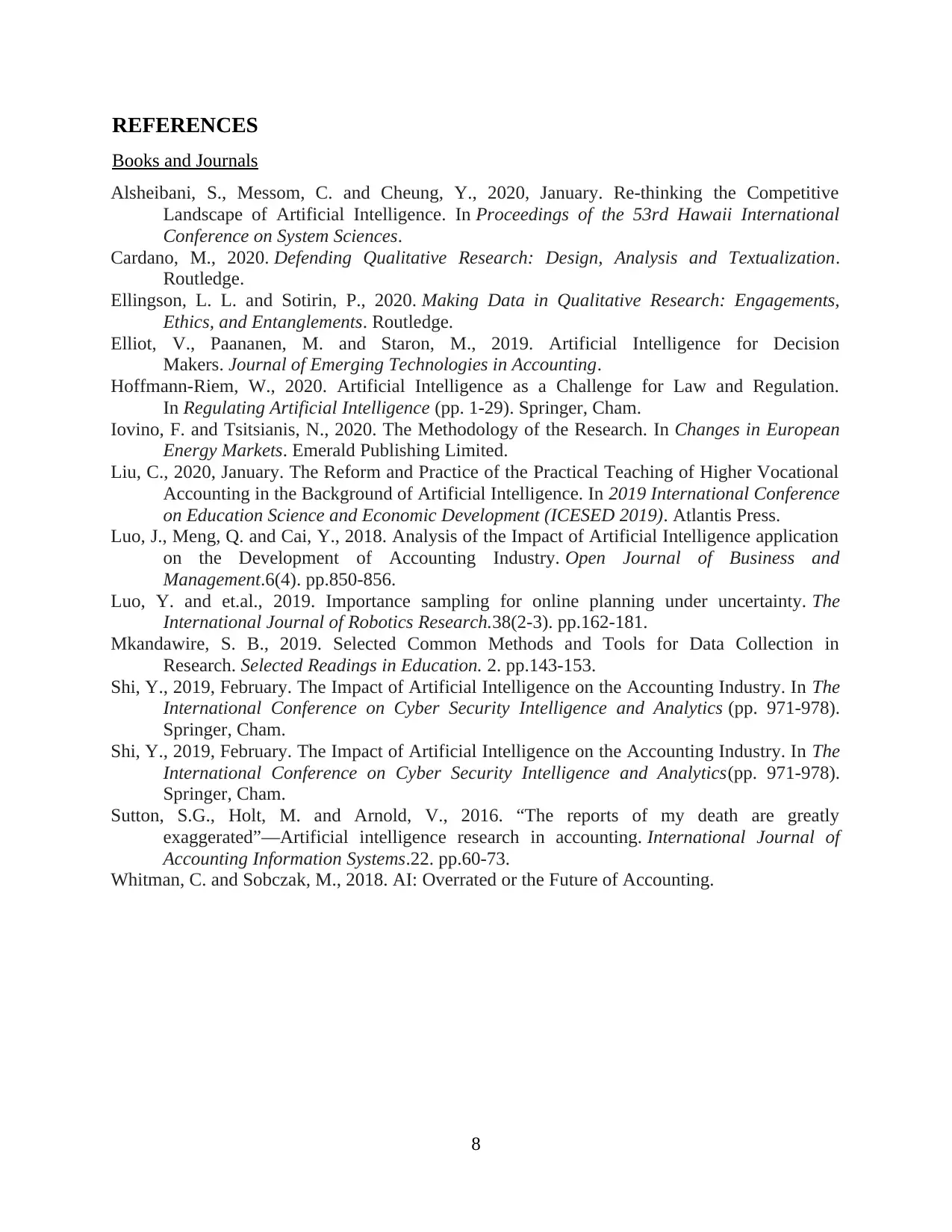
REFERENCES
Books and Journals
Alsheibani, S., Messom, C. and Cheung, Y., 2020, January. Re-thinking the Competitive
Landscape of Artificial Intelligence. In Proceedings of the 53rd Hawaii International
Conference on System Sciences.
Cardano, M., 2020. Defending Qualitative Research: Design, Analysis and Textualization.
Routledge.
Ellingson, L. L. and Sotirin, P., 2020. Making Data in Qualitative Research: Engagements,
Ethics, and Entanglements. Routledge.
Elliot, V., Paananen, M. and Staron, M., 2019. Artificial Intelligence for Decision
Makers. Journal of Emerging Technologies in Accounting.
Hoffmann-Riem, W., 2020. Artificial Intelligence as a Challenge for Law and Regulation.
In Regulating Artificial Intelligence (pp. 1-29). Springer, Cham.
Iovino, F. and Tsitsianis, N., 2020. The Methodology of the Research. In Changes in European
Energy Markets. Emerald Publishing Limited.
Liu, C., 2020, January. The Reform and Practice of the Practical Teaching of Higher Vocational
Accounting in the Background of Artificial Intelligence. In 2019 International Conference
on Education Science and Economic Development (ICESED 2019). Atlantis Press.
Luo, J., Meng, Q. and Cai, Y., 2018. Analysis of the Impact of Artificial Intelligence application
on the Development of Accounting Industry. Open Journal of Business and
Management.6(4). pp.850-856.
Luo, Y. and et.al., 2019. Importance sampling for online planning under uncertainty. The
International Journal of Robotics Research.38(2-3). pp.162-181.
Mkandawire, S. B., 2019. Selected Common Methods and Tools for Data Collection in
Research. Selected Readings in Education. 2. pp.143-153.
Shi, Y., 2019, February. The Impact of Artificial Intelligence on the Accounting Industry. In The
International Conference on Cyber Security Intelligence and Analytics (pp. 971-978).
Springer, Cham.
Shi, Y., 2019, February. The Impact of Artificial Intelligence on the Accounting Industry. In The
International Conference on Cyber Security Intelligence and Analytics(pp. 971-978).
Springer, Cham.
Sutton, S.G., Holt, M. and Arnold, V., 2016. “The reports of my death are greatly
exaggerated”—Artificial intelligence research in accounting. International Journal of
Accounting Information Systems.22. pp.60-73.
Whitman, C. and Sobczak, M., 2018. AI: Overrated or the Future of Accounting.
8
Books and Journals
Alsheibani, S., Messom, C. and Cheung, Y., 2020, January. Re-thinking the Competitive
Landscape of Artificial Intelligence. In Proceedings of the 53rd Hawaii International
Conference on System Sciences.
Cardano, M., 2020. Defending Qualitative Research: Design, Analysis and Textualization.
Routledge.
Ellingson, L. L. and Sotirin, P., 2020. Making Data in Qualitative Research: Engagements,
Ethics, and Entanglements. Routledge.
Elliot, V., Paananen, M. and Staron, M., 2019. Artificial Intelligence for Decision
Makers. Journal of Emerging Technologies in Accounting.
Hoffmann-Riem, W., 2020. Artificial Intelligence as a Challenge for Law and Regulation.
In Regulating Artificial Intelligence (pp. 1-29). Springer, Cham.
Iovino, F. and Tsitsianis, N., 2020. The Methodology of the Research. In Changes in European
Energy Markets. Emerald Publishing Limited.
Liu, C., 2020, January. The Reform and Practice of the Practical Teaching of Higher Vocational
Accounting in the Background of Artificial Intelligence. In 2019 International Conference
on Education Science and Economic Development (ICESED 2019). Atlantis Press.
Luo, J., Meng, Q. and Cai, Y., 2018. Analysis of the Impact of Artificial Intelligence application
on the Development of Accounting Industry. Open Journal of Business and
Management.6(4). pp.850-856.
Luo, Y. and et.al., 2019. Importance sampling for online planning under uncertainty. The
International Journal of Robotics Research.38(2-3). pp.162-181.
Mkandawire, S. B., 2019. Selected Common Methods and Tools for Data Collection in
Research. Selected Readings in Education. 2. pp.143-153.
Shi, Y., 2019, February. The Impact of Artificial Intelligence on the Accounting Industry. In The
International Conference on Cyber Security Intelligence and Analytics (pp. 971-978).
Springer, Cham.
Shi, Y., 2019, February. The Impact of Artificial Intelligence on the Accounting Industry. In The
International Conference on Cyber Security Intelligence and Analytics(pp. 971-978).
Springer, Cham.
Sutton, S.G., Holt, M. and Arnold, V., 2016. “The reports of my death are greatly
exaggerated”—Artificial intelligence research in accounting. International Journal of
Accounting Information Systems.22. pp.60-73.
Whitman, C. and Sobczak, M., 2018. AI: Overrated or the Future of Accounting.
8
1 out of 10
Related Documents
Your All-in-One AI-Powered Toolkit for Academic Success.
+13062052269
info@desklib.com
Available 24*7 on WhatsApp / Email
![[object Object]](/_next/static/media/star-bottom.7253800d.svg)
Unlock your academic potential
Copyright © 2020–2026 A2Z Services. All Rights Reserved. Developed and managed by ZUCOL.



